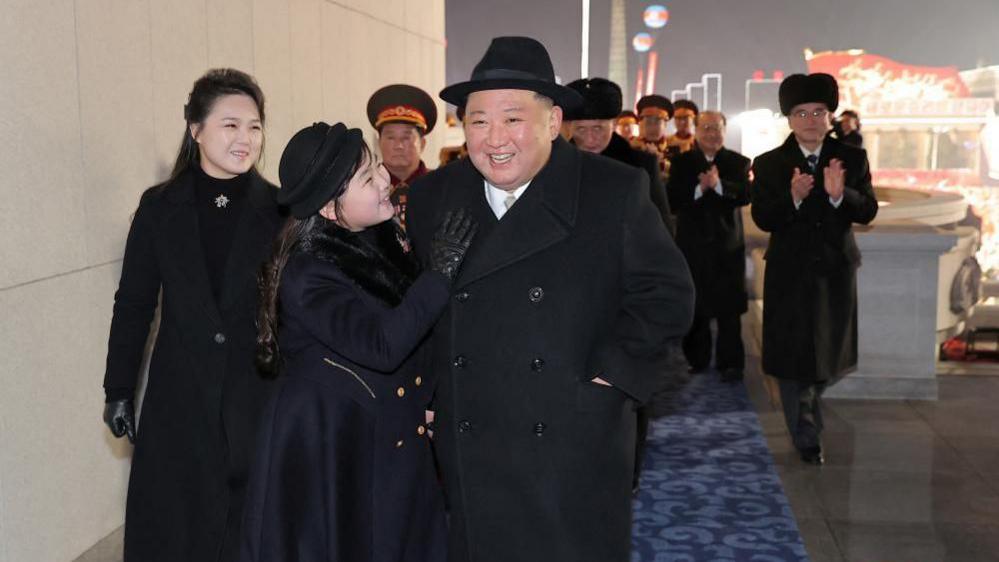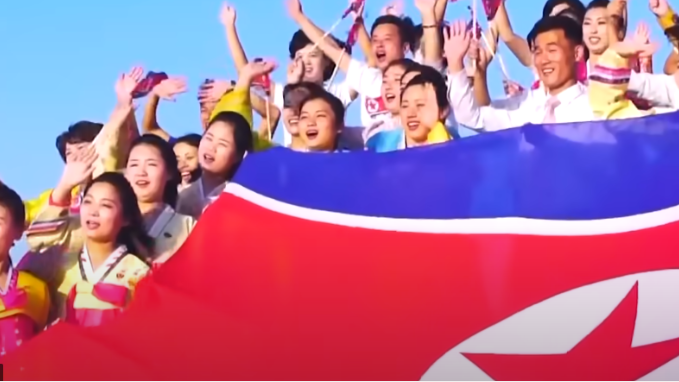South Korea bans TikTok hit 'idolising' Kim Jong Un

Kim Jong Un attends a military parade with his wife Ri Sol Ju (left) and their daughter Kim Ju Ae (centre)
- Published
South Korea has said it will ban a viral North Korean propaganda tune that extols Pyongyang's dictator Kim Jong Un as a "friendly father" and "great leader".
Seoul's media regulator said the music video, which has become a hit on TikTok since its release in April, is a violation of the country's National Security Act.
"[The song] idolizes Kim Jong Un and praises and glorifies him," Seoul's Korea Communications Standards Commission said in a statement on Monday.
The Security Act blocks access to the North's government websites and media, and penalises behaviours and speeches in favour of the regime.
Twenty-nine versions of the Friendly Father music video will be blocked, the commission said, but it did not elaborate on how that would be done. The decision was prompted by a request from South Korea's National Intelligence Service, it added.
“The video is typical content linked to psychological warfare against South Korea, as it was posted on a channel operated to connect with the outside world and is mainly focused on unilaterally idolising and glorifying Kim,” the regulator said.
Why North Korea's latest propaganda bop is a huge TikTok hit
- Published4 May 2024
Watch the North Korean propaganda song that’s a TikTok hit
The impending ban has piqued the interest of South Koreans, many of whom have checked out the music video since the announcement, according to comments they have left on the video. Some commented that the authorities should leave the video accessible "so that more people can enjoy the joke".
Friendly Father is the latest in a line of pop songs Pyongyang's propaganda machine has churned out in the past 50 years.
The bright-tempoed, catchy hit describes Mr Kim as “father” and “the Great” - terms previously reserved for North Korea’s first leader, his grandfather Kim Il Sung.
“Let’s sing Kim Jong Un, the great leader/ Let’s brag about Kim Jong Un, our friendly father,” it goes.
Some TikTok users say the tune accompanies them at the gym or while doing homework, while others like its nostalgic style, saying it reminds them of older Spanish and French pop music.
The two Koreas have been divided since an armistice ended the Korean War in 1953.
They did not sign a peace treaty and therefore are technically still at war.
Violations of Seoul's National Security Act can lead to up to seven years in jail, although enforcement of the law has eased recently. There have also been calls to review the law on free speech grounds.
Additional reporting by Jake Kwon in Seoul

A screengrab of the music video for Friendly Father, the latest North Korean propaganda song